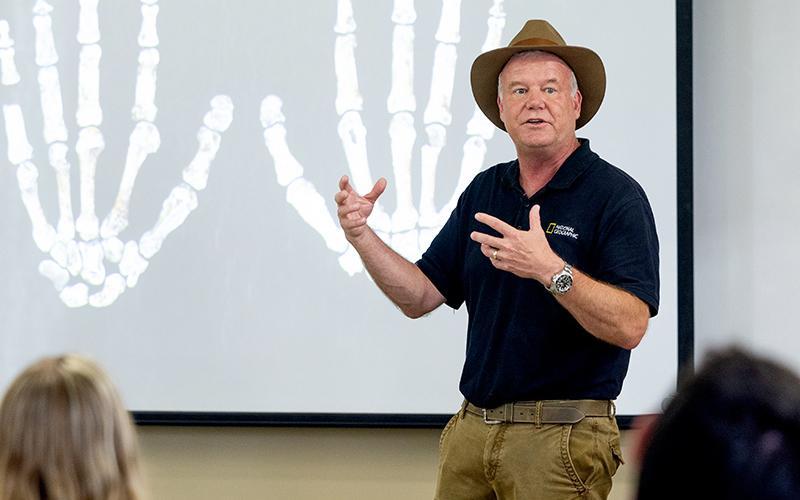Paleoanthropologist Lee Berger visits Tulane anthropology classes
World-renowned paleoanthropologist Lee Berger of University of the Witwatersrand in South Africa visited Tulane on Friday, Sept. 15, to give lectures to students in two of Professor Trenton Holliday’s anthropology classes. Berger, a current National Geographic Explorer-in-Residence, is most well-known for his discovery of two hominin species: Homo naledi and Australopithecus sediba. He is currently traveling around the United States as part of a tour promoting a new book and documentary on Netflix, both called Cave of Bones.
Berger spoke to Holliday’s Neandertal Enigma and Introduction to Biological Anthropology classes about his research and the Rising Star expedition, which explores caves in the Cradle of Humankind World Heritage Site in South Africa and led to the discovery of H. naledi. Holliday, a professor in the Department of Anthropology in the School of Liberal Arts, was a part of the Rising Star team that published the discovery in 2015.
Part of why the Rising Star specimens were so amazing is the small brain size. H. naledi lived about 230,000 to 330,000 years ago, at the same time as Neandertals and early Homo sapiens but had significantly smaller brains, similar in size to chimpanzee brains.
“In this course, you’ll see,” Berger said to the Introduction to Biological Anthropology class, “we are a field of fragments.” He pointed out how anomalous it was that his team found so many specimens of H. naledi in a single cave.
Holliday sat in the front row, joining the class for the day, as his students listened with rapt attention. They were able to get glimpses into what they will be learning for the remainder of the year.
At one point, Berger had a student stand up to compare her height to the average height of H. naledi. “Imagine a smaller head and sloping shoulders,” said Berger as he projected an image of an H. naledi skeleton projected on the screen behind him.
“You are the most powerful generation,” Berger said to the room of students, holding up his phone, “because of these things your parents and grandparents hate.” He spoke about the immediate access to information the students in the classroom have that he didn’t at the same stage in his career.
He has abundant hope for this upcoming generation of anthropologists. “We, humans, may have walked over every inch of this planet,” he said, “but we haven’t really seen it.” What his research really teaches, he concluded, is that “we have a lot more to discover.”

